Verdir les opérations
« Je veux explorer toutes les voies possibles pour lutter contre les changements climatiques », a affirmé la présidente de la BCE lors d’un entretien accordé au Financial Times. Elle s’est dite convaincue par le fait que « les changements climatiques ont un impact sur la stabilité des prix ».
« Si nous ne mesurons pas les répercussions, si nous n’anticipons pas la sécheresse, si nous n’anticipons pas les variations des prix des aliments, de l’énergie, des services, alors nous ne faisons pas notre travail », a affirmé Christine Lagarde.
Selon elle, cet engagement doit s’appliquer à « tous les secteurs d’activité et les opérations dans lesquels nous sommes engagés pour lutter contre les changements climatiques. Parce qu’au bout du compte, l’argent parle. »
D’après les analystes, l’engagement à verdir les actions de la BCE pourrait passer par des plans de relance conditionnés à des objectifs environnementaux. Le programme de rachats d’actifs de 2800 milliards d’euros, engagé par la BCE depuis 2015 pour soutenir l’économie, serait également concerné.
Une marge de manœuvre limitée
Si les intentions de Christine Lagarde semblent claires, elle risque toutefois de se heurter aux limites du mandat de la BCE, qui est normalement cantonnée au maintien de la stabilité monétaire.
Ainsi, sortir de son bilan des obligations émises par des groupes trop polluants irait actuellement à l’encontre de la neutralité exigée par le Traité européen, qui oblige les banques centrales à refléter la composition de l’ensemble des titres disponibles sur le marché.
D’après Xavier Timbeau, directeur de l’Observatoire français des conjonctures économiques (OFCE) : « Les règles d’achats d’actifs qui ont été énoncées ne vont pas être modifiées dans le court terme. Les instruments et les objectifs de la BCE sont essentiellement monétaires et techniques […] la question environnementale n’y intervient pas ».
Pour lui, les questions environnementales sont avant tout politiques et l’institution indépendante qu’est la Banque centrale ne peut en l’état actuel des choses pas intervenir dans ce domaine.
Cependant, la BCE détient déjà des émissions vertes, sur la base d’un label vert. De nouvelles règles pourraient donc bien voir le jour, même s’il faudra pour cela attendre la fin de la revue stratégique de la BCE, prévue pour le dernier trimestre 2021.
